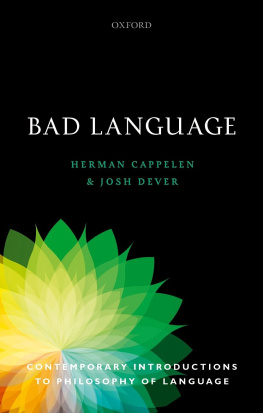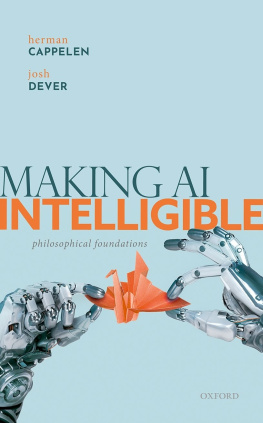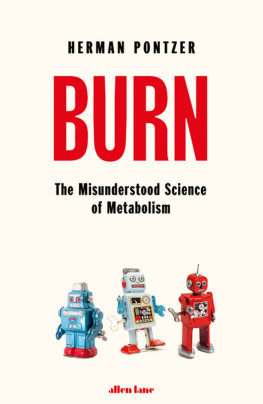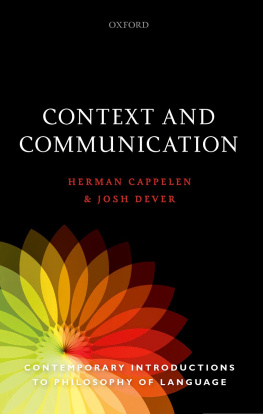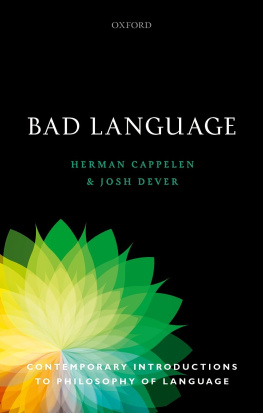Bad Language
Contemporary Introductions to Philosophy of Language
Herman Cappelen and Josh Dever
Context and Communication
Puzzles of Reference
Bad Language
Further titles in preparation
Bad Language
Herman Cappelen and Josh Dever
Great Clarendon Street, Oxford, OX2 6DP, United Kingdom
Oxford University Press is a department of the University of Oxford. It furthers the Universitys objective of excellence in research, scholarship, and education by publishing worldwide. Oxford is a registered trade mark of Oxford University Press in the UK and in certain other countries
Herman Cappelen and Josh Dever 2019
The moral rights of the authors have been asserted
First Edition published in 2019
Impression: 1
All rights reserved. No part of this publication may be reproduced, stored in a retrieval system, or transmitted, in any form or by any means, without the prior permission in writing of Oxford University Press, or as expressly permitted by law, by licence or under terms agreed with the appropriate reprographics rights organization. Enquiries concerning reproduction outside the scope of the above should be sent to the Rights Department, Oxford University Press, at the address above
You must not circulate this work in any other form and you must impose this same condition on any acquirer
Published in the United States of America by Oxford University Press 198 Madison Avenue, New York, NY 10016, United States of America
British Library Cataloguing in Publication Data
Data available
Library of Congress Control Number: 2018964270
ISBN 9780198839644 (hbk.)
ISBN 9780198839651 (pbk.)
ebook ISBN 9780192576002
Printed and bound in Great Britain by Clays Ltd, Elcograf S.p.A.
Links to third party websites are provided by Oxford in good faith and for information only. Oxford disclaims any responsibility for the materials contained in any third party website referenced in this work.
Contents
Detailed Contents
Much philosophy of language is an effort to theorize about language as an idealized object and communication as an idealized activity. This is natural because many theoretical advances result from making idealizing assumptions. However, at some point its important to move away from the idealization and back to the real world. This book is an introduction to some of the linguistic phenomena that come into focus only when standard idealizing assumptions are dropped. We live in a world where speakers constantly lie and are non-cooperative: they say things that make no sense; they insult, bullshit, silence, and coerce each other. This book is an introduction to these darker sides of real-world language use. Alternative titles for this book could be Language in the Real World or The Dark Side of Language Use.
As with the other books in this series, this book is not meant to be a comprehensive guidethe dark side of language is too vast for us to cover it all in one book. We dont aspire to comprehensiveness. Instead, we have picked some topics , views , and arguments that we think are important , interesting , and instructive . Our hope is that a reader who has understood and engaged with this selection of material will be in a good position to start engaging with much of the work we dont cover in this book.
The book is written to be accessible to someone with no prior knowledge of the material. It can be used as part of a philosophy of language course or as part of a general introduction to philosophy.
We initially set out hoping to write a single book that could serve as an introduction to philosophy of language. We gave up. We now think that goal is too ambitious for any one book. There is simply too much interesting work that has been done within this field over the last 100 years to cover it all (or even most of it) in a single book. A book that tried to do that would inevitably be so superficial that it would fail to convey to the readers how rich, complex, and important these topics are. To do justice to the field we have set out to write a series of introductions to philosophy of language, each one covering an important topic, each one of which would be a way into the field as a whole. These books aim to provide systematic introductions to important questions, data, theories, and arguments. Those looking for a history of the discipline should look elsewhere.
Matthew McKeever was our research assistant for the entire period we worked on this book. He did an extraordinary job (as he also did helping us with the first two books in this series). Similarly, Joshua Habgood-Coote helped a lot with the early stages of this book and gave us many useful suggestions. In the final stages we also got invaluable assistance from Deborah Marber and Matthew Cameron. Our editor at OUP, Peter Momtchiloff, suggested the title for the book and provided much appreciated continuous support.
In this book we are interested in how language works in the rough and tumble of the real world, full of hucksters, shysters, manipulators, and bullshitters. A central problem in thinking carefully about the role of language in this rough and tumble is that our theoretical tools for analyzing language have been developed using examples of the much more demure setting of the classroom. In the classroom, we are all scholars, and we imagine (or hope) that there is no mere rhetoric, no lies, no deception, and no obfuscation. If we model our theories of language on this setting, then we will tell a highly idealized picture about how language works. The highly idealized picture has the advantage of being simple, but its simplicity is a defect when it comes time to step outside the classroom and consider how mere mortals use language. Before we start considering how to use and modify our existing theoretical tools to deal with a decidedly non-ideal world, we need to understand what simplifying assumptions went into those tools.
In what follows we outline some idealizations that have guided many of the efforts to theorize about natural language, communication, and speakers. There is no one set of idealizations that are common to all theorists, but the seven idealizations we sketch below are representative of much contemporary work.
Much work on language takes well-ordered classroom conversations as the model for how language works in general. In the classroom, we are (at least sometimes) engaged in a cooperative and collaborative effort to work out what is true. Paul Grice helped give cooperativeness a central place in theorizing about language by formulating what he called the Cooperative Principle:
Make your conversational contribution such as is required, at the stage at which it occurs, by the accepted purpose or direction of the talk exchange in which you are engaged. (Grice : 26)
Grice thinks of the Cooperative Principle as a rule that we expect each other to be following when we speak. As Grice says:
Our talk exchanges do not normally consist of a succession of disconnected remarks, and would not be rational if they did. They are characteristically, to some degree at least, cooperative efforts; and each participant recognizes in them, to some extent, a common purpose or a set of purposes, or at least a mutually accepted direction. (Grice : 26)
This gives us our first idealizing assumption:
Idealization 1 : Conversation and communication are fundamentally cooperative activities. In a conversation, there is a goal to be achieved, and each participant in the conversation contributes to the conversation in an attempt to further that goal.



